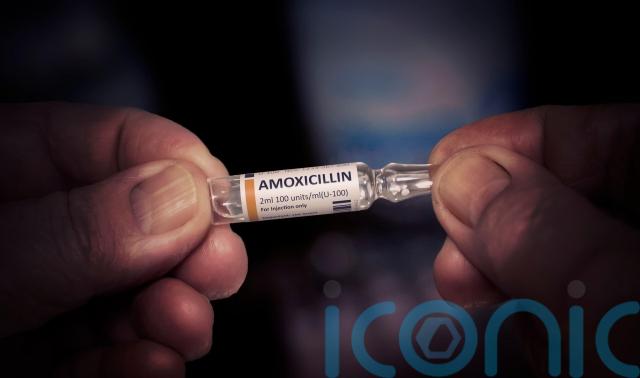
A notice warning that antibiotics used to treat Group A Strep infections may be “temporarily in limited supply” in some places has been issued by the Scottish Government.
There has been an increase in cases in recent weeks and the alert notice says supplies of antibiotics for treating the infections have seen a surge in demand.
There were 967 laboratory reports of Group A Streptococcus (GAS) in the week ending December 11, Public Health Scotland (PHS) figures show, well above the 300-480 reports per week during peaks observed in the period since 2016.
The supply alert notice states that supplies of antibiotics for the treatment of Group A Strep may be temporarily in limited supply at certain wholesalers and pharmacies.

However it says supplies are available with manufacturers, and deliveries into wholesalers and pharmacies are “being expedited and are expected in the coming days”.
Guidance has been issued to pharmacists on what antibiotics can be used if first line treatment is not available.
PHS received reports of six new cases of the more serious Invasive Group A Streptococcal infections (iGAS) between December 5 and 11 across all age groups in Scotland, with no new reports in children under 10 since last week’s report.
Speaking at First Minister’s Questions on Thursday, Nicola Sturgeon said “nobody is burying their heads in the sand” on the antibiotic supply issue.
She was responding to a question from Scottish Conservative MSP Rachael Hamilton, who said doctors in her constituency in the south of Scotland have described the situation as “horrendous”.
Ms Sturgeon said powers over the supply of medicine are reserved to Westminster.

She continued: “We are of course aware of some localised supply problems with penicillin and amoxicillin liquid preparations due to the increase in demand across the whole of the UK.
“These types of demand shortages are not uncommon, the NHS has robust systems in place to deal with them.
“The assessment right now is that there is sufficient supply within the UK to meet these needs.”
Strep A bacteria are commonly found in the throat and on the skin, and some people have no symptoms.
Infections caused by Strep A include the skin infection impetigo, scarlet fever and strep throat.
While the vast majority of infections are relatively mild, sometimes the bacteria cause iGAS, a life-threatening infection in which the bacteria has invaded parts of the body, such as the blood, deep muscle or lungs.
There have been no deaths in Scotland, however 16 children elsewhere in the UK have now died from invasive Strep A infection.
Most strep A infections are mild and easily treated, but some are more serious.
Visit the NHS website to learn more about symptoms to look out for, when to seek medical help and what to do in an emergency. ➡️ https://t.co/2TUbmO8nFb#StrepA #GroupAStrep pic.twitter.com/To5B9YzseA
— UK Health Security Agency (@UKHSA) December 12, 2022
Dr Nick Phin, director of public health science at PHS, said: “Public Health Scotland continues to monitor infections caused by Group A Strep (GAS), which have been increasing since the beginning of October.
“Whilst GAS infections, including scarlet fever and tonsillitis, are common; the more serious Invasive GAS infections are very rare.
“The bacteria causing GAS infections is usually found in the throat and on the skin. We would, therefore, encourage adults to ensure children wash their hands frequently with soap and water, and to cover their mouth and nose with a tissue when they cough or sneeze and then put the used tissue in the bin.
“These simple actions can help to reduce the spread of common infections like Group A Strep.”
The supply alert notice advises pharmacists to order antibiotic stocks in line with patient demand and avoid ordering excessive quantities.
It also asks them to note that, where possible, tablet and/or capsules should be prescribed to preserve stocks of liquid preparations.
A Scottish Government spokesperson said: “As medicine supply is a reserved matter, the Health Secretary has spoken to the UK Government to seek assurances about the supply of antibiotics.
“They have advised that while there is adequate supply of antibiotics to treat Strep A in the UK, we are seeing a sharp increase in demand for certain types of antibiotics – in particular liquid preparations – because of the recent rise in cases and this is causing temporary shortages in some localised areas.
“As the First Minister told Parliament today, these situations are not uncommon and the NHS has robust procedures to deal with them. Wholesalers and manufacturers are working at speed to replenish the stock on an ongoing basis and further work is in hand to further strengthen the supply chain resilience, including increasing the manufacturing of antibiotics.
“In the meantime, doctors and pharmacists have been provided with advice – through a medicine supply alert notice routinely used in such situations – on effective alternatives such as crushing or dissolving solid oral forms of the antibiotics used to treat Strep A, or prescribing other clinically equivalent antibiotics.”
Subscribe or register today to discover more from DonegalLive.ie
Buy the e-paper of the Donegal Democrat, Donegal People's Press, Donegal Post and Inish Times here for instant access to Donegal's premier news titles.
Keep up with the latest news from Donegal with our daily newsletter featuring the most important stories of the day delivered to your inbox every evening at 5pm.